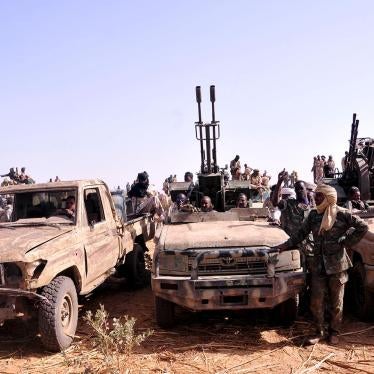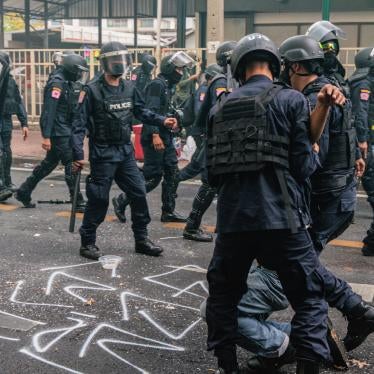In a letter to the South African government, Human Rights Watch/Africa and the HRW Arms Project ask South Africa to take steps to guarantee that arms it sells are not used in the conflict in Sudan. This would include preventing other states from transferring the arms to the government of Sudan, to the rebel Sudan People's Liberation Army, and to others fighting in Sudan.
A copy of the letter follows.
August 28, 1997
President Nelson Mandela
President
Private Bag X83
Pretoria 0001
RE: Suggested end use restrictions regarding Sudan on transfers of South African arms
Dear President Mandela:
Your Defence Minister Joe Modise was quoted by the South African Press Agency on August 7, 1997, as saying that the South African National Defense Forces (SANDF) is planning to sell excess anti-aircraft weapons, Buffel infantry vehicles, Puma helicopters, and other war materiel.
Human Rights Watch writes to request that you do not transfer any weapons, either those mentioned or others, to any party to the conflict in Sudan. Both the Sudanese government and the Sudan People's Liberation Army (SPLA) are guilty of gross violations of human rights and international humanitarian law, as we have documented in numerous reports.
We note that South Africa has a policy of not selling arms to the Sudanese government or to nongovernment forces. In order to guarantee that arms you sell do not end up in the hands of parties to the Sudanese conflict, we request that you impose restrictions on the end use of all arms your government sells, forbidding any recepient of South African arms from transfering or using, directly or indirectly, these weapons to or for the benefit of the parties to the Sudan conflict. In order to guarantee that this restriction is respected, we suggest that you adopt provisions such as those outlined in appendix A to this letter.
The ban on weapons transfers also should be applied specifically to Sudanese militia groups and muraheleen (tribal militias) operating under government sponsorship or with implicit consent, and those former rebel groups now aligned with the government such as Riak Machar's United Democratic Salvation Front. It should be applied as well to the opposition coalition, the National Democratic Alliance (NDA), of which the SPLA is an important member.
We are particularly concerned about reports that the SPLA is now seeking to obtain anti-aircraft weapons to use in the siege of Juba, a southern garrison town in which at least 100,000 civilians reside; these civilians would be cut off from necessary airlifts of food should all air transport be prevented. The Sudanese government is said to be stepping up its use of helicopters in the war against the SPLA, and has shown no regard for civilian lives in its attacks to date. Furthermore, there is evidence that the Sudan government is supplying arms, including but not limited to land mines, to rebel groups in neighboring countries. One such group, the Ugandan Lord's Resistance Army, has a particularly bad record of abuses directed at children.
We note that you are now actively involved in the search for peace in Sudan. Although we do not take a position on peace negotiations, ceasefires, or the merits of the war, it is clear that the continuing flow of arms into Sudan, where the parties are already heavily armed, will do nothing to improve the lot of the civilians who have borne the brunt of the war for fourteen years. We therefore urge that you insure that no South African arms are used into this conflict.
Sincerely,
/s/ /s/
Peter Takirambudde Joost Hiltermann
Executive Director Executive Director
Human Rights Watch/Africa Human Rights Watch Arms Project
Draft Provisions Suggested for Agreements Governing Arms Sales, Leases or Transfers between the Government of South Africa and Any Other Entity ("Purchaser")
1.1 The Purchaser agrees, except as may otherwise be mutually agreed in writing, to use the defense articles sold, leased or transferred hereunder only
1.1.1 For internal security, individual self-defense, or civic action;
1.1.2 For national self-defense from foreign invasion; or
1.1.3 For peackeeping pursuant to a resolution by the United Nations Security Council, the Organization of African Unity, or the Inter-Governmental Authority on Development.
1.2 The Purchaser will not transfer title to, or possession of, the defense articles, components and associated support material, related training or other defense services or technology furnished under this agreement, to anyone who is not an officer, employer, or agent of the Purchaser (excluding transportation agencies), and shall not use or permit their use for purposes other than those authorized above, unless the written consent of the government of South Africa has first been obtained. The Purchaser agrees that the defense articles sold will not be transferred to any party to the conflict in Sudan, used inside the territory of Sudan (except as provided in 1.1.3 above), and recognizes that the Ministry of Foreign Affairs of the government of South Africa is required to be notified by the Purchaser of any substantial evidence that the defense articles sold, leased or transferred in this agreement have been used in a manner which is inconsistent with this provision.
1.3. The Purchaser agrees that the government of South Africa will assist it in observing and reporting on the utilization of defense articles and services acquired through sale, lease or other transfer from the government of South Africa.
1.3.1 The Purchaser agrees that it will cooperate fully with any agency designated by the government of South Africa to investigate wherther there has been a breach of the provision of this agreement relating to a prohibition on transfers of defense materials to any party to the conflict in Sudan, or the use of these defense materials inside the territory of Sudan.
1.4 The Purchaser agrees that when a South African-origin defense article has fulfilled its requirement and the Purchaser desires to dispose of the article, there are three proper methods to use:
1.4.1 The item may be destroyed with no recognizable residue (i.e., burned).
1.4.2 The military capability may be removed, whereby the item becomes eligible for transfer to a third party such as a scrap dealer.
1.4.3 The item, while retaining its military capability, may not be transferred to another country or armed group without prior written and public agreement with the government of South Africa.







